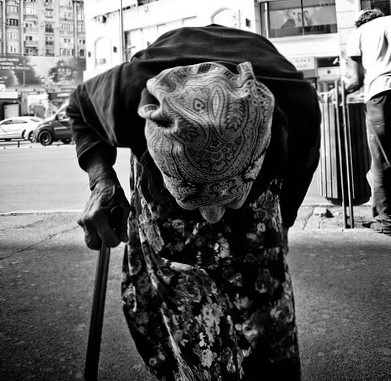Revised Common Lectionary Reflection, Proper 16 (21), Eleventh Sunday after Pentecost, Year C
August 25, 2019
Lessons: Isaiah 58:9b-14; Psalm 103:1-8; Hebrews 12:18-29; Luke 13:10-17
Theme: God’s faithful and generous people, as stewards of the gospel, recognize that their own need for liberation and healing is intricately woven with that of others.
Key Scripture: But the Lord answered him and said, “You hypocrites! Does not each of you on the sabbath untie his ox or his donkey from the manger, and lead it away to give it water? And ought not this woman, a daughter of Abraham whom Satan bound for eighteen long years, be set free from this bondage on the Sabbath day?”– Luke 13:15-16
 Uh Oh! Jesus is throwing around that “hypocrite” word again, this time condemning the religious leaders for misusing Sabbath law and preventing healing and restoration of a daughter of Abraham. Add to that the words of the Lord in Isaiah that provide another interpretation of sabbath, that of caring for those who are suffering and on the margins. How then, are we to preach and teach Jesus’ words and the prophet’s divinely inspired admonitions?
Uh Oh! Jesus is throwing around that “hypocrite” word again, this time condemning the religious leaders for misusing Sabbath law and preventing healing and restoration of a daughter of Abraham. Add to that the words of the Lord in Isaiah that provide another interpretation of sabbath, that of caring for those who are suffering and on the margins. How then, are we to preach and teach Jesus’ words and the prophet’s divinely inspired admonitions?
I have to admit that I’m looking at the lessons in new light. Until today I have written about and preached these lessons through a decidedly white lens of privilege. Granted, I have been earnest and sincere in my attempts to be faithful, but my understanding of these lessons has largely ignored the perspectives of my sisters and brothers experiencing various forms of oppression, racial injustice, and poverty. In doing so, I have missed out on the fullness of God’s gifts and intent for all people, including myself. Particularly for those of us who are ministers in the Evangelical Lutheran Church in America, these lessons provide a timely opportunity to educate congregants about recent actions taken at our Churchwide Assembly (See note at the end of this reflection.) and to open a dialogue about how to move beyond words to action and how to critique our own social locations when reading scripture.
In past Year C cycles I have looked at Luke 13:10-17 as an admonition to observe sabbath rest, as a call to see that others are able to enjoy rest, and as a call to greater faithfulness. Yes, those elements are certainly there, but there is so much more to be encountered in a faithful reading of this gospel.
A reading of a call for sabbath rest infers that people have the resources to spend a day of rest. Such a reading also assumes full participation in a Protestant work ethic, bootstraps mentality, and system of economics that supports such an ethic and mentality — in short, a white-privileged North American perspective. In this reading, liberation might involve time in a hammock, a higher tip for the server at the restaurant, and time away from our digital devices. Don’t get me wrong; there’s nothing inherently wrong in these things. Rest is a biblical mandate. Providing a handsome tip is helpful, and spending time away from Twitter and Facebook is essential for maintaining one’s perspective and a healthy blood pressure reading.
But just how might our brown and black siblings, God’s people whose social location is often found along the margins, define Sabbath liberation? What about a living wage? Good educational opportunities for their children? The freedom to buy a home in the neighborhood of their choice? To feel safe on the streets and in shops and other public spaces? The list could go on and on, but I hope you get the picture of what how this week’s lessons are working on me.
I used to see the bent over woman purely in terms of an elderly, marginalized Jewish woman in need of healing. Sure, I could see beyond the physical need to the importance of restoration to her full dignity and place in community, but I basically saw her as other — a two-dimensional woman in a Bible story who served only to illustrate my larger homiletical purpose. Yes, I failed to see her as Jesus saw her, as a beautiful, beloved daughter, sibling, a person of great worth. Instead, I was content to hang out somewhat uncomfortably in the camp of the hypocritical church leaders that Jesus denounces for their jot and tittle adherence to rules and strictures. That reading allowed me to celebrate the need for Sabbath as rest and reclamation of right ordered faith. And, it gave me an out to avoid tackling the more difficult concept of which Jesus speaks: Liberation and freedom from bondage.
 Now I see not only Jesus’ desire to liberate my siblings on the margins from bondage and oppression under which they have suffered for so long and continue to endure to this day, but I understand that I, too, am bent over and bound. I have seen only a limited view of others from the perspective of my own bondage to the white-privileged view in which I have been steeped my entire life. By listening to, hearing, and honoring the experience and view of my black and brown siblings, my own bent back is being straightened and my eyes opened to walk with those who have been marginalized, to speak truth in love, and to preach the whole gospel, not just the comfortable and safe parts. And yes, there’s a long way to go and much hard, holy work to do.
Now I see not only Jesus’ desire to liberate my siblings on the margins from bondage and oppression under which they have suffered for so long and continue to endure to this day, but I understand that I, too, am bent over and bound. I have seen only a limited view of others from the perspective of my own bondage to the white-privileged view in which I have been steeped my entire life. By listening to, hearing, and honoring the experience and view of my black and brown siblings, my own bent back is being straightened and my eyes opened to walk with those who have been marginalized, to speak truth in love, and to preach the whole gospel, not just the comfortable and safe parts. And yes, there’s a long way to go and much hard, holy work to do.
My prayer for all of us is that we do not allow ourselves to be crippled and bent by the narrow margins of our own world views and cultural mindsets and that we open our hearts, minds, and hands to the way Christ offers, to the fullness of life and creation that is intended for us. For all of us. What new vision and perspective might you see in this story?
(For ELCA ministers: Please check churchwide and synodical resources to help you explain the recent important Assembly actions including becoming a sanctuary church body, presenting a “Declaration of the ELCA to People of African Descent,” Adopting a resolution to commemorate June 17 as a day of repentance in the ELCA for the martyrdom of the Emanuel 9, and approving the social statement “Faith, Sexism and Justice: A Call to Action.” Click here for a summary of actions.)
In Worship
What does liberation mean in your context? How is worship an act of celebration of God’s liberating work in your community’s life and in the individual lives of the people? What healing needs to take place in your faith community? In the wider community? In our nation? In the world? Let the congregation shape prayer petitions this week for liberation and healing.
Consider singing “The Canticle of the Turning” as one of the hymns today.
With Youth
If you remove the yoke from among you, the pointing of the finger, the speaking of evil, if you offer your food to the hungry and satisfy the needs of the afflicted, then your light shall rise in the darkness and your gloom be like the noonday. Isaiah 58-10-11
Use this week’s Old Testament lesson, particularly the two verses above to start a conversation about what God is calling the people of Israel to do. How does this apply to us today? Are we succeeding in what God asks of us? What might we need to do differently?
With Children
This week’s focus verse is Psalm 103:1– Bless the LORD, O my soul, and all that is within me, bless his holy name.
Invite the children to consider what this verse means. What does the song writer want us to do? Remind them of the first thing that the bent over woman in Luke’s gospel did when she was healed by Jesus. She praised God. We, too, should thank and praise God every day–and not just in our prayers before dinner and bedtime. Ask the children to think of times and situations when we should praise and give thanks to God. Honor and affirm their answers. Finish with a blessing and a prayer that praises and gives thanks to God for each child.
Weekly Stewardship Bulletin Insert
This week’s gospel reminds us that following Jesus may mean that we have to approach scripture and discipleship in new ways, view them through different lenses, and move out of our comfort zones; this too is stewardship.
Stewardship at Home
What implicit or explicit biases, cultural filters, and privileges may be preventing you from fully encountering scripture and your siblings who look and/or act differently from you? This week spend some time praying about and examining your heart and mind. Pray for an open mind, a willingness to be uncomfortable, and the strength to lean in and learn. Some places to start? Check out this article on implicit bias from the Kerwin Institute. Here’s a book list for white readers on dismantling racism. If you’re willing to be challenged, check out Pastor Lenny Duncan’s book Dear Church: A Love Letter from a Black Preacher to the Whitest Denomination in the US. Read your church’s social statements and pastoral letters concerning racism, bias, immigration, and gender violence and inequity. Seek out others for conversation. Listen. Pray. Learn. Repeat.
2016 Reflection: https://www.stewardshipoflife.org/2016/08/straighten-up-steward/
2013 Reflection: https://www.stewardshipoflife.org/2013/08/what-better-day-for-freedom/
2010 Reflection: https://www.stewardshipoflife.org/2010/08/preaching-what-we-dont-practice/
Images: J Stimp; James R. Bowe, and Mervi Eskelinen, Creative Commons usage license. Thanks!
Note: Reprint rights granted to congregations and other church organizations for local, nonprofit use. Just include this note: “Copyright (c) 2019, Rev. Sharron Blezard. Used by Permission.” Other uses, please inquire: thewritelife@hotmail.com.




Leave a Reply